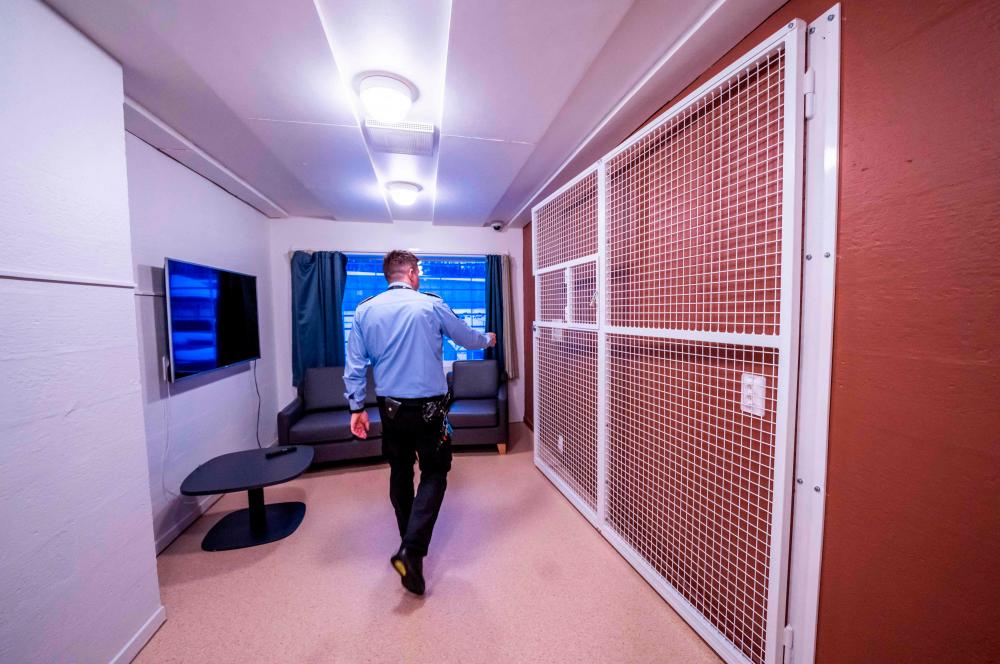OSLO: Anders Behring Breivik, the right-wing extremist who killed 77 people in 2011, is “suicidal” due to his strict prison conditions, his lawyer said as his trial against the Norwegian state opened Monday.
“The main damage linked to Breivik’s isolation is that he no longer has the desire to live. You can call it a depression,“ lawyer Oystein Storrvik told the court, convened in the gymnasium of Ringerike prison for security reasons.
“At times, he is more or less suicidal,“ Storrvik added, citing an incident where Breivik -- whom Storrvik says now takes Prozac to get through his days in prison -- cried out “Kill me! Please, kill me.”
Breivik, now 44, has been held apart from other inmates in high-security facilities for over 11 years.
He argues that his extended isolation is a violation of Article 3 of the European Convention on Human Rights, which prohibits “inhumane” and “degrading” treatment.
Breivik appeared Monday clad in a dark suit, a greying beard and a shaved head, refraining from the provocative gestures he has made on previous occasions.
On July 22, 2011, Breivik set off a bomb near government offices in Oslo, killing eight people, before gunning down 69 others, mostly teens, at a Labour Party youth wing summer camp on the island of Utoya.
He was sentenced in 2012 to 21 years in prison, which can be extended as long as he is considered a threat.
“He’ll never get out, he’s well aware of that,“ Storrvik told the court.
“Can you hand down a (de facto) life sentence and prevent him from any human contact while the sentence is served?” he asked the court.
He argued that Norwegian authorities had not put sufficient measures in place to compensate for Breivik’s relative isolation.
Breivik’s human interaction is mostly limited to contacts with professionals such as wardens, lawyers and a chaplain, “without any possibility to have real friendships,“ Storrvik said.
Citing another article of the Convention on Human Rights that guarantees the right to correspondence, Breivik has also asked for an easing of his letter-writing restrictions.
- Pet budgies -
In the Ringerike prison located on the shores of the lake that surrounds the island of Utoya, Breivik has access to several rooms, including a kitchen, a TV room with a game console, and an exercise room, pictures published by the Norwegian news agency NTB show.
Prison officials have also complied with his request for a pet by providing him with three budgies, NTB said.
Norway prides itself on a humane prison system aimed at rehabilitation rather than punishment.
The state has said that Breivik’s isolation is relative and justified due to the danger he presents, and that his prison conditions are warranted to protect society, other inmates and wardens, as well as himself given risks from other inmates.
Breivik enjoys “a wide range of activities” such as cooking, games, walks and basketball, and “there is no indication that he is suffering from physical or mental problems due to his prison conditions,“ the state’s lawyer Andreas Hjetland said in court documents.
“Breivik has so far shown little interest in rehabilitation work,“ he added.
“It is therefore difficult to imagine which significant improvements in his prison conditions are possible and justified in the short term.”
- ‘Burden’ for the families -
Breivik has in the past used his public appearances as platforms to air his political ideology and provocations, including Hitler salutes and tirades, which have been painful for survivors and relatives of the victims.
“Many are fed up and try to keep this all at a distance,“ Lisbeth Kristine Royneland, the head of a support group for families of the victims and who lost her 18-year-old daughter on Utoya, told AFP.
“Naturally people feel this is a burden because it brings back memories,“ said another group member Merete Stamneshagen, who also lost her 18-year-old daughter on the island.
The Oslo court has barred Breivik’s testimony, due on Tuesday, from being broadcast in the media, saying it could “divert attention away from the question at hand and put the focus on his ideological message.”
Breivik has already sued the Norwegian state on the same grounds, with an Oslo court stunning the world in 2016 when it ruled his isolation was a breach of his rights.
On appeal, Norway’s higher courts found in the state’s favour, and the European Court of Human Rights in 2018 dismissed his case as “inadmissible”. -AFP









